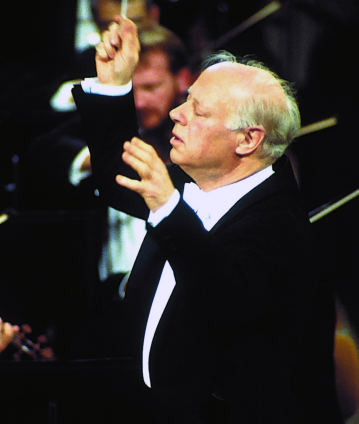Bernard Haitink conducts Mahler’s First Symphony

When the young Gustav Mahler composed his First Symphony, he was at a crossroads: should he turn to the cutting edge programme music or find new directions for absolute music? Mahler chose a middle path which combines both goals with great virtuosity: atmospheric sounds of the world of nature and lieder quotes on the one hand, and an impressive symphonic grand concept on the other. The conductor is Bernard Haitink, one of Mahler’s most notable interpreters.
Since his debut in 1964, Bernard Haitink has been one of the most faithful and closest artistic partners of the Berliner Philharmoniker. In more than 50 years, he has conducted countless performances in the Philharmonie and accompanied the orchestra on several guest tours; he also appeared at the Easter Festival in Salzburg and conducted the European concerts in London (1993) and Krakow (1999). Haitink belongs to the exclusive circle of guest conductors who have conducted staged opera performance with the Philharmoniker – Mozart’s Figaro was presented in Salzburg in 1991 –, and in 2004 he was accepted into the even more exclusive circle of the Philharmoniker’s honorary members. The repertoire which they have performed together is a compendium of Classical-Romantic symphonic music, plus compositions by Dmitri Shostakovich, Béla Bartók and from French Modernism. And yet the performance of Gustav Mahler’s music by the orchestra over a period of decades is of particular importance.
In 1961, Bernard Haitink took over the direction of the Royal Concertgebouw Orchestra in his home town of Amsterdam when still a very young man. The orchestra formerly had a significant Mahler tradition – its former chief conductor Wilhelm Mengelberg had been a great admirer and good friend of the composer. But Mahler’s music was at first alien to Haitink, even triggering a feeling of “alarm” in him. When a record company wanted a Mahler cycle with an estimated production time of two years, Haitink refused and insisted that there should be no more than one of the composer’s symphonies each year. This carefully forged partnership proved to be stable and lasting: Haitink became a central protagonist of the Mahler Renaissance, and has performed nearly 300 concerts of the composer’s music with the Concertgebouw Orchestra.
It is no surprise that the Berliner Philharmoniker engaged him again and again as a Mahler interpreter: since 1971, Haitink has performed Mahler’s nine completed symphonies – many of them several times –, plus the Lied von der Erde and the Adagio from the Tenth with the orchestra in Berlin, and also in New York, Amsterdam, London and Salzburg. And in Sir Simon Rattle’s farewell season as chief conductor of the Philharmoniker, he expressly wished his Dutch colleague, who he had admired since his teens, to conduct the Ninth. Haitink’s Mahler performances with the Berliner Philharmoniker are documented in CD and video recordings from the 1990s – including the First Symphony, which can be seen here.
Gustav Mahler worked on his first contribution to the genre for four years and then revised the version of the world premiere of 1889. The complicated history of its genesis is also a result of Mahler’s wavering at the time between absolute and programme music. Ultimately, the composer turned away from its genre designation of symphonic poem, the programmatic movement names and the work title Titan after the novel by Jean Paul: the music was to speak for itself. And yet the work evokes a shimmering and ambiguous world of images. The introduction, permeated by cuckoo calls, creates a painting in musical form that brings a Romantic nature boy from the world of the Wunderhorn poems into play with a quotation from Mahler’s song “Ging heut morgen übers Feld”. The third movement is an early example of Mahler’s alienating adaptation of folklore material, with Frère Jacque’s canon in a minor key. Following imaginings of chaos and darkness, the finale ultimately leads to triumph, in which the ambiguity so characteristic of Mahler’s tonal language is still recognisable.
© 1994 EuroArts Music International, brilliant media, SFB in association with Philips Classics
Artistes
Nos suggestions
- 1993 Europakonzert from London with Bernard Haitink and Frank Peter Zimmermann
- Bernard Haitink dirige Schubert et Mahler
- Bernard Haitink dirige Beethoven et Wagner
- Bernard Haitink dirige Mozart et Bruckner
- Bernard Haitink conducts Mahler’s Fourth Symphony
- Bernard Haitink dirige Schubert et Chostakovitch